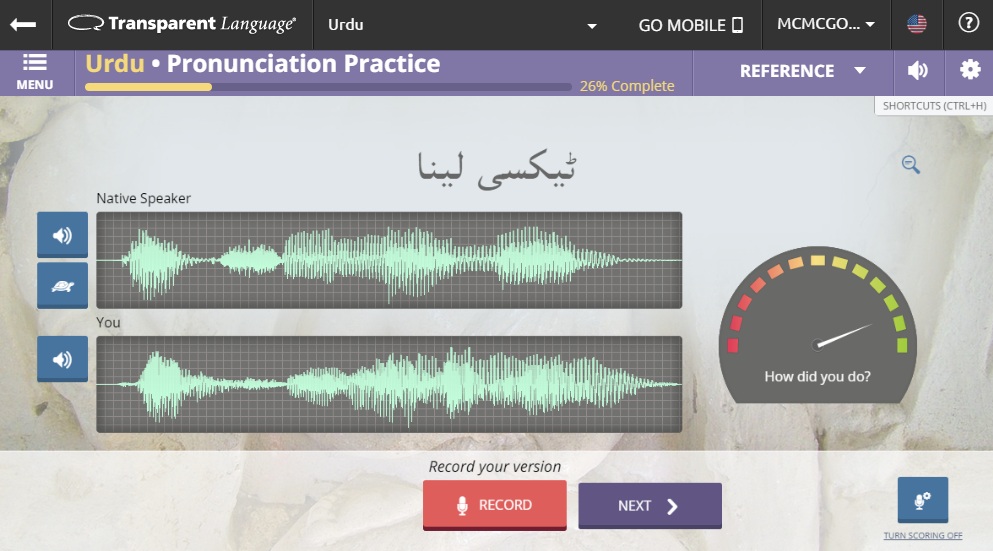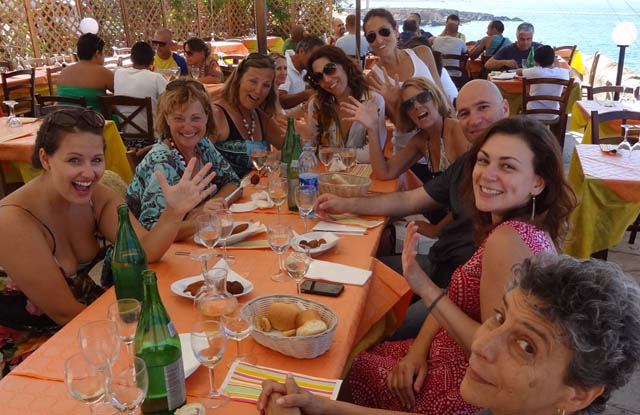10 Ways to Practice Pronunciation (Serious Commitment Required!) Posted by Transparent Language on Jan 13, 2014 in Archived Posts
The other day someone asked me: “How much time do you actually devote to learning Italian?” At first the question stopped me in my tracks. Then I realized why: I don’t just concentrate on Italian skills for fifteen minutes or even thirty minutes a day. For me learning Italian isn’t just about memorizing grammar and vocabulary. Ultimately, it is what I can DO with the language that is the biggest motivator, so I strive to transform each day into a creative language learning immersion experience. A big part of this process includes finding new and interesting ways to practice my pronunciation skills.
Here’s some of my favorite ways to practice speaking, but be warned, they’re not for the lazy language learner:
1. Active Listening
The first step towards figuring out how to pronounce something correctly is to hear it accurately. If you don’t, you are at a constant disadvantage when attempting to speak the language. For instance, there are just some sounds in the Italian language that are quite unfamiliar to a native English speaker’s ear, like pronouncing the “gn” sound as in “gnocchi”. Every language features diphthongs, vowel combinations, liaisons, and so forth that create unfamiliar and frustrating sounds. If you can’t hear those differences, then you’re stuck trying to memorize abstract facts.
Thus to speak a language well, it is extremely important to do some “active listening” to train your ear to the sounds and the rhythms of the language. Pick out a couple of TV shows to watch and listen to, or rent films on Netflix. By watching movies you will visually see their facial expressions, hand gestures, and body language, that are all a part of active communication in a language. You will also pick up how words are said, where the emphasis is placed on syllables, as well as slang, idioms, and colloquial speech.
2. Read Out Loud
Another way to improve your language diction is to read out loud. Find an interesting book in your target language and start reciting away. You can easily find a wide assortment of books in your target language on Amazon. When you read someone else’s words you are free to concentrate on style and inflection and not worry about relaying your own thoughts or ideas. When I read aloud I will often repeat passages, slowly waving my hand as I would a baton to modulate my delivery and create a fluid speech pattern. Remember, you don’t have to speak fast to sound fluent, you just need to enunciate clearly and speak smoothly. As in all things, practice makes perfect and the repetition of spoken sounds will be more effectively retained in your long-term memory.
3. Talk to Yourself
Once you’re comfortable just speaking out loud, you can move on from books to just speaking freely.Sometimes the presence of others can make you self-conscious and seriously dampen your desire to practice. But, there are places you can escape to where you can unleash your inner language thespian. The car is a great place to pop in a language CD and repeat dialogues or phrases spoken by native speakers. Somehow traffic and stop lights don’t seem so annoying when you are working on your pronunciation and responding to language exercises. You can find musical artists from your target country on iTunes and give your pipes a workout.
4. Record Your Voice
 Let’s face it. No one likes the sound of their own voice! Horrors of horrors if you record your own voice in another language! But seriously, making a recording of yourself speaking in the target language can be quite effective and illuminating as you learn to self-correct your own speech. You can simply use your iPhone or iPad to record yourself reading from a book or newspaper. Transparent Language also offers a Pronunciation Practice activity with EveryVoice™ speech analysis software that allows you to record your speech and compare it to that of a native speaker.
Let’s face it. No one likes the sound of their own voice! Horrors of horrors if you record your own voice in another language! But seriously, making a recording of yourself speaking in the target language can be quite effective and illuminating as you learn to self-correct your own speech. You can simply use your iPhone or iPad to record yourself reading from a book or newspaper. Transparent Language also offers a Pronunciation Practice activity with EveryVoice™ speech analysis software that allows you to record your speech and compare it to that of a native speaker.
5. Work with a Voice Coach or Tutor
One set back for language learners is that when they speak, instead of sounding lyrical and lilting they sound stilted and disjointed. This is a dead giveaway to a native speaker that you are not fluent causing him to respond in English (instead of the language you dearly want use instead). Also, language learners can be shy or embarrassed about their newly acquired language skills, and sometimes they will end their statements as questions, or let their voices trail away in a mumble to mask the lack of linguistic confidence. By learning good breath control, proper posture, and how to project from your diaphragm you will improve your vocal power and feel more confident. To help with these things, I suggest that you work with a voice coach or private language tutor. A private tutor will also help with enunciation, word emphasis, and phonic recognition. In the past I have found some wonderful language coaches simply by Googling “Italian Tutors” in my area. You can also check sites such as Omniglot and WyzAnt or check the “services offered” in your local “Craigs List”.
6. Find a Language Partner on Skype
Learning a language is all about making conversation. So go out there and find a language partner. Trust me. It is the best way you can break through inhibitions and start feeling comfortable with speaking. In my own personal experience, I have found language partners through a couple of different chat sites and message boards, such as Palabea. The Palabea site is especially interesting as you can create your own “topic of conversation” based on your own personal interest. If you are passionate about “Baroque Art” or “Italian Movies” you create a “palabea” and invite others to have a conversation with you about that subject. My chat partners have become great friends and we have even met in person during my travels in Italy.
7. Keep Your Language Radar Active
Wherever I go, my Italian radar is always active and functioning. Whether I am at the park, watching my son’s soccer game, or shopping at the supermarket, I am tuned in and listening for spoken Italian around me, ready to introduce myself and have a conversation. If I learn through the grapevine that an Italian family lives in my community, I will introduce myself and invite them out for coffee. Keep your language radar up and running every day. It takes a little bit of courage but the payoff is wonderful. You will make friends with natives in your own town who are more than happy to speak to you in their own language.
8. Join a MeetUp Group (Or Create Your Own!)
Cities across the country have language-related Meetup groups that meet on on a weekly or monthly basis. Simply visit the site and search for a location nearest you. If the Meetup is too far away, do what I did. Take the reins and start your own. Send invitations out to expats in your community. Reach out to language students at the local high school or community college. Advertise the group on Facebook targeting people in your area who are interested in the language. There’s a million ways to get the word out there. Once a group is established, meet for discussions, movie nights, etc.—all in the target language!
9. Host an Exchange Student
If you’re serious about practicing the language, hosting an exchange student is the way to go. You will have no excuse not to engage with a native speaker on a daily basis, and you get the added benefit of helping him or her improve in English as well. I hosted an Italian AFS high school exchange student in my home for a year, and in turn she invited my family and I to spend several weeks with her family in Italy. It is the most personalized, profound way I have been able to practice my pronunciation. AFS arranges exchanges with students from more than 90 countries, and countless other exchange organizations exist, so you’re bound to find a speaker of your language of interest!
10. Travel with an Arranged Immersion Trip
This is another suggestion that requires some serious commitment, but it’s worth it if you’re truly dedicated to perfecting your pronunciation. Traveling to the target country is always a great way to get some practice in speaking the language. But think of the rewards of traveling with someone who has connections to locals and can get you off the beaten path. It’s on those adventures that you’ll get some authentic face time with native speakers who aren’t brushing you off in English. Since 2012, I have led four trips to Italy via Matta language and cultural immersion trips to Italy. I partner with Italian schools and event planners to create unique learning experiences, including working with local pastry makers, olive oil producers, and wine makers (because for us Italian learners, it’s all about the cuisine!) You will be amazed how much your pronunciation will improve when you are traveling with like-minded language learners. Laughter, wine, and camaraderie are wonderful catalysts for loosening up tongues, starting conversations and improving fluency.
The Studentessa Matta blog is written in Italian to exercise & flex language skills. The blog explores all aspects of Italian culture & current events in a light and humorous way, as the author works her way towards fluency. Also featured on the blog are language learning tips, videos & articles, as well as opportunities to travel and study Italian in Italy. Drop by the Matta Blog at http://www.studentessamatta.com to say hi and leave a comment.

Build vocabulary, practice pronunciation, and more with Transparent Language Online. Available anytime, anywhere, on any device.








Comments:
Melissa Muldoon:
Thank for the opportunity to write a guest post for the Transparent Language blog! I had great fun putting together my tips and language learning suggestions for the community! Buoni studi! Melissa